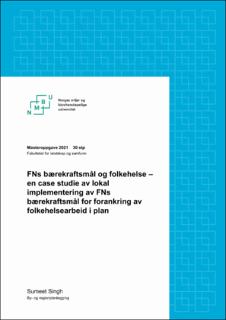| dc.contributor.advisor | Ridderstrøm, Gunnar | |
| dc.contributor.advisor | Richardson, Timothy Kevin | |
| dc.contributor.author | Singh, Sumeet | |
| dc.date.accessioned | 2021-10-27T08:49:48Z | |
| dc.date.available | 2021-10-27T08:49:48Z | |
| dc.date.issued | 2021 | |
| dc.identifier.uri | https://hdl.handle.net/11250/2825898 | |
| dc.description.abstract | FNs 17 bærekraftsmål og de tilhørende 169 delmålene setter nye globale mål for den ønskede retning for utviklingen av verden. Disse målene setter bærekraftig utvikling på agendaen, og skal implementeres både nasjonalt og lokalt. Dette gjelder også for planlegging. Bærekraftsmålene forankres i norsk planlegging gjennom de nasjonale forventningene til regional og kommunal planlegging. Det forventes at fylker og kommuner legger til grunn bærekraftsmålene i samfunns- og arealutviklingen. De norske fylkene og kommunene er fortsatt i en tidlig fase med dette arbeidet. Det forventes at oppfølging av bærekraftsmålene vil føre med seg konsekvenser for folkehelsearbeidet både nasjonalt, men også lokalt.
Bærekraftsmålene dekker en stor agenda, hvor folkehelse er en liten del. Allikevel har ikke helse blitt så sentralt plassert i en global agenda som sikter på å endre verden. Til tross for et eget bærekraftsmål som formulerer mål om god helse og livskvalitet, kan alle bærekraftsmålene kobles til folkehelsearbeid. Dette er en del av det norske kommuner forventes å arbeide med når de skal planlegge for det lokale samfunnet.
Ettersom alle bærekraftsmålene kan kobles til folkehelsearbeid, har formålet med denne studien vært å undersøke hvilke mål kommuner faktisk implementeres for å forankre folkehelsearbeid, og hvilke tiltak som planlegges for, for å imøtekomme de globale målene. Avgrensning av bærekraftsmålene er gjort med utgangspunkt i mål som folkehelsemeldingen fra 2019 og Helsedirektoratet (2018) trekker frem som relevante mål for folkehelsen i Norge.
Casestudie er valgt som studiedesign i denne oppgaven. Metoden har bestått av en kvalitativ dokumentanalyse av kommuneplanens samfunnsdel. Hurdal kommune som var blant de første kommunen i Norge til å implementere bærekraftsmålene er valgt som case.
Hovedfunnene i denne studien viser at kommuneplanens samfunnsdel har implementert bærekraftsmål som er sammenfallende med bærekraftsmålene som nasjonale myndigheter peker på som relevante på et nasjonalt nivå. Dette gjelder i hovedsak både de overordnede bærekraftsmålene, men også tilhørende delmål. Funnene viser allikevel noen avvik mellom målene som pekes på som relevant for folkehelsen av myndighetene og målene kommunen har implementert eller ikke implementert. Tiltakene som planlegges for og som skal følge opp bærekraftsmålene kommunen har implementert for å forankre folkehelsearbeidet skyves i hovedsak til videre planprosesser i form av kommunedelplaner som ikke er ferdig utarbeidet. | en_US |
| dc.description.abstract | The UN's 17 sustainability goals and the associated 169 sub-goals set new global goals for the desired direction for the development of the world. These goals put sustainable development on the agenda and must be implemented both nationally and locally. This also applies to planning. The sustainability goals are anchored in Norwegian planning through the national expectations for regional and municipal planning. As a result, counties and municipalities are expected to implement the sustainability goals in community- and area planning. The Norwegian counties and municipalities are still in an early phase of this work. It is expected that follow-up of the sustainability goals will have consequences for public health work both nationally but also locally. The sustainability goals cover a large agenda, where public health is a small part. Yet health has not been so centrally placed in a global agenda aimed at changing the world. Despite a separate sustainability goal that formulates goals for good health and quality of life, all sustainability goals can be linked to public health work. This is part of what Norwegian municipalities are expected to work with when planning for the local community. Since all the sustainability goals can be linked to public health work, the purpose of this study has been to examine which goals municipalities actually implement to anchor public health work, and what measures are planned for, in order to meet the global goals. Case study is chosen as the study design in this thesis. The method has consisted of a qualitative document analysis of the community part of the municipal plan. Hurdal municipality, which was among the first municipalities in Norway to implement the sustainability goals, has been chosen as a case. The main findings of this study show that the community part of the municipal plan has implemented sustainability goals that coincide with the sustainability goals that national authorities point out as relevant at a national level. This mainly applies to both the overall sustainability goals, but also the associated sub-goals. The findings nevertheless show some discrepancies between the goals that are pointed out as relevant to public health by the authorities and the goals that the municipality has implemented or not implemented. The measures that are planned for and that will follow up the sustainability goals that the municipality has implemented to anchor the public health work are mainly postponed to further planning processes in the form of municipal sub-plans that have not been prepared. | en_US |
| dc.language.iso | nob | en_US |
| dc.publisher | Norwegian University of Life Sciences, Ås | en_US |
| dc.rights | Attribution-NonCommercial-NoDerivatives 4.0 Internasjonal | * |
| dc.rights.uri | http://creativecommons.org/licenses/by-nc-nd/4.0/deed.no | * |
| dc.title | FNs bærekraftsmål og folkehelse : en case studie av lokal implementering av FNs bærekraftsmål for forankring av folkehelsearbeid i plan | en_US |
| dc.type | Master thesis | en_US |
| dc.description.localcode | M-BYREG | en_US |

